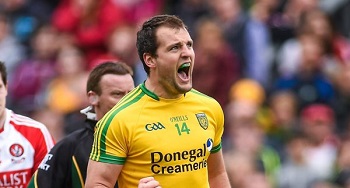Michael Murphy still remembers the day the call came from Jim McGuinness.
It was in the autumn of 2010 and Donegal football was resting somewhere in that vast void between full-on crisis and another period of hope.
Murphy captained the Under-21s of 2010 to Ulster glory and to within the width of a crossbar of pipping Dublin in an All-Ireland final. At senior level, Murphy had yet to win a game in the Ulster Championship, even if he’d been on the panel since the summer of 2007.
He was at home in Bomany, on a quiet country road outside Letterkenny, when McGuinness – who had just been appointed as senior manager following the departure of John Joe Doherty.
McGuinness wanted Murphy to be his captain.
“It wasn’t something that I just said yes to right away,” Murphy, now 27, says ahead of his seventh summer as Donegal’s skipper.
“I was so young. I remember getting the call from Jim. I was down in the bedroom. I still remember exactly where I was and what I was doing. It was a shock.
“I always had a massive interest in the game. I still do now. If there is a game on anywhere I’ll go and watch it. Did it change me? I don’t think it did. For the first while, maybe when I wasn’t playing well there was pressure. That’ll happen any captain.
“If you don’t play well the first thing you think of is that. If you’re captain you need to perform. That’s pressure you put on yourself.
“There were a lot of big leaders in that side. Even over the last number of years we’ve had that.
“Likewise now, the younger lads are different. There are so many different personalities, different characters. I enjoy that. But I know fine well when I’m not performing myself as a player or captain, I’ll know it’s time to ship it on.”
In his first year as captain, Murphy led Donegal to a Division 2 League title in the spring but, more pertinently, to Tir Chonaill’s first Ulster title in 19 years.
After two narrow defeats in the Ulster finals of 2015 and 2016, Donegal begin another tilt at the Anglo Celt on Sunday when Antrim visit Ballybofey.
Donegal have been in the last six Ulster finals, winning three and losing three.
The passing of time surprises Murphy.
“It’s ridiculous really,” he says.
“It’s a cliché and people say it’ll all be over before you know it. They’re right. The years just roll into each other.
“That’s probably the big change. One time you could let yourself go for a month or two and ‘winter well’ as they say. Now, you look after yourself. If you don’t, you’re already playing catch up. It’s just not worth putting yourself through that.”
Antrim, from the depths of Division 4 are seen as fodder for a side of Donegal’s ambitions, but the memories of 2009 still haunt Murphy. Then, the Saffrons rolled up to Mac Cumhaill Park and shocked Donegal.
Two years later, Donegal got over the line against Antrim in a game that saw Pat Spillane coin the ‘puke football phrase’. It was a day that kick-started the Donegal renaissance.
“It was a win!” Murphy exclaims now.
He spent a week at Clermont Auvergne in the winter and he’s looking as lean as ever. From a deep role, he played the role of the conductor for Donegal in the League, a Gaelic football quarterback perhaps and is form, even if he won’t say it himself, is likely to be the making of Donegal.
“I don’t know about that,” he says.
“Injury wise it is better. That’s a big plus. You ask any player and they’ll tell you they just want to be injury free. That magic number, if you can get that six weeks uninterrupted without any knocks or niggles then it’s a big help. I got that early on in the year and you can kick on from that.”
Donegal’s new era will dawn on Sunday and Murphy believes their winnings from underage level will stand the new batch in good stead.
Could it be the new weapon that will help punch through the teak-tough defences of the likes of Kerry, Dublin and Tyrone?
He says: “These younger lads now are really focused and driven. In terms of their application and the need to get onto them; you actually don’t. They have been brilliant – that’s the positive from coming through a successful system from U16 through to here.
“There is now a certain way of playing, certain way of training and a certain expectation. They have been brought up with that and that’s the difference now with these lads coming in. They don’t know any different. It’s not the culture shock it was for that last generation.”







